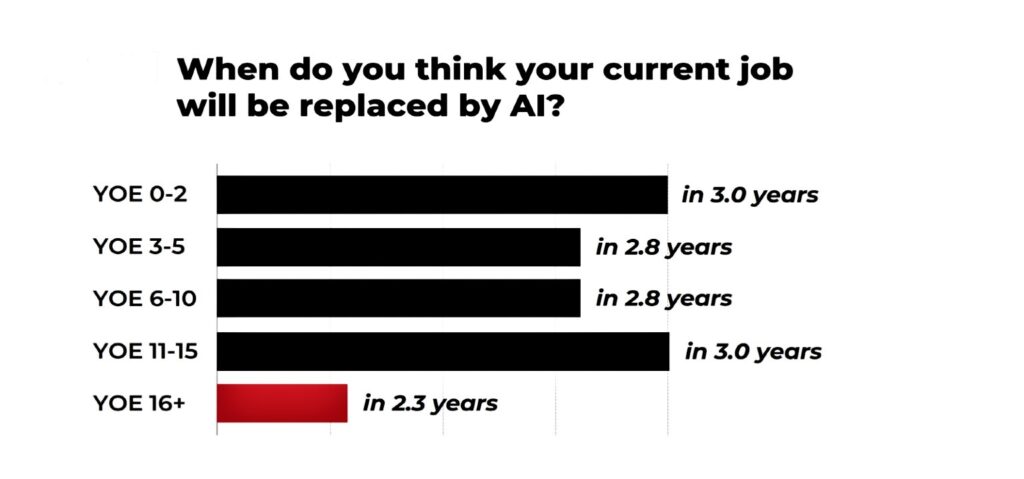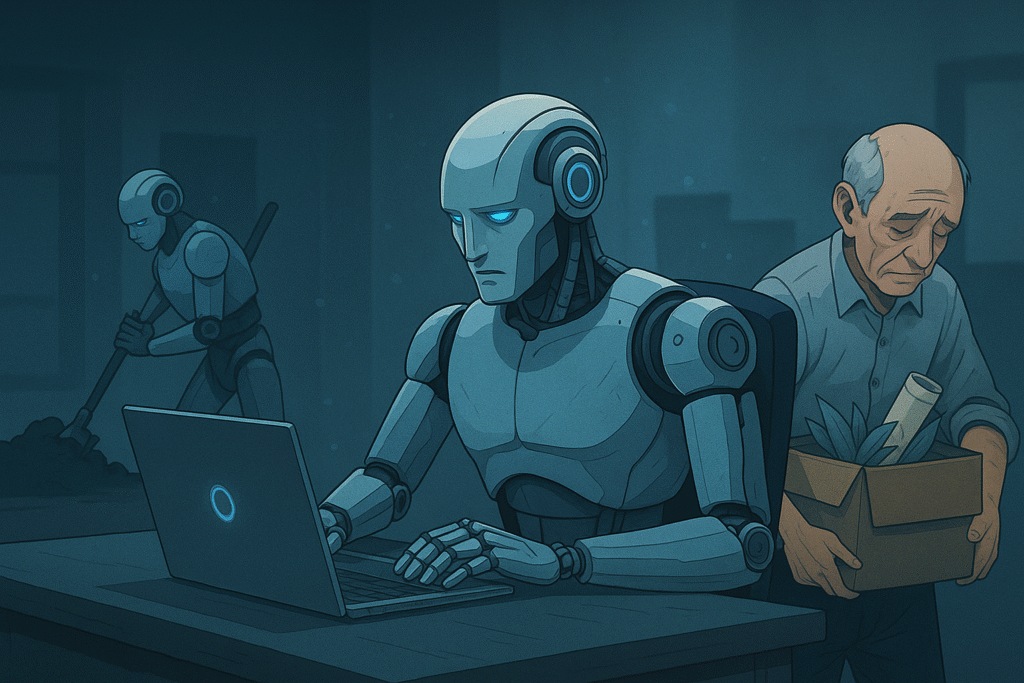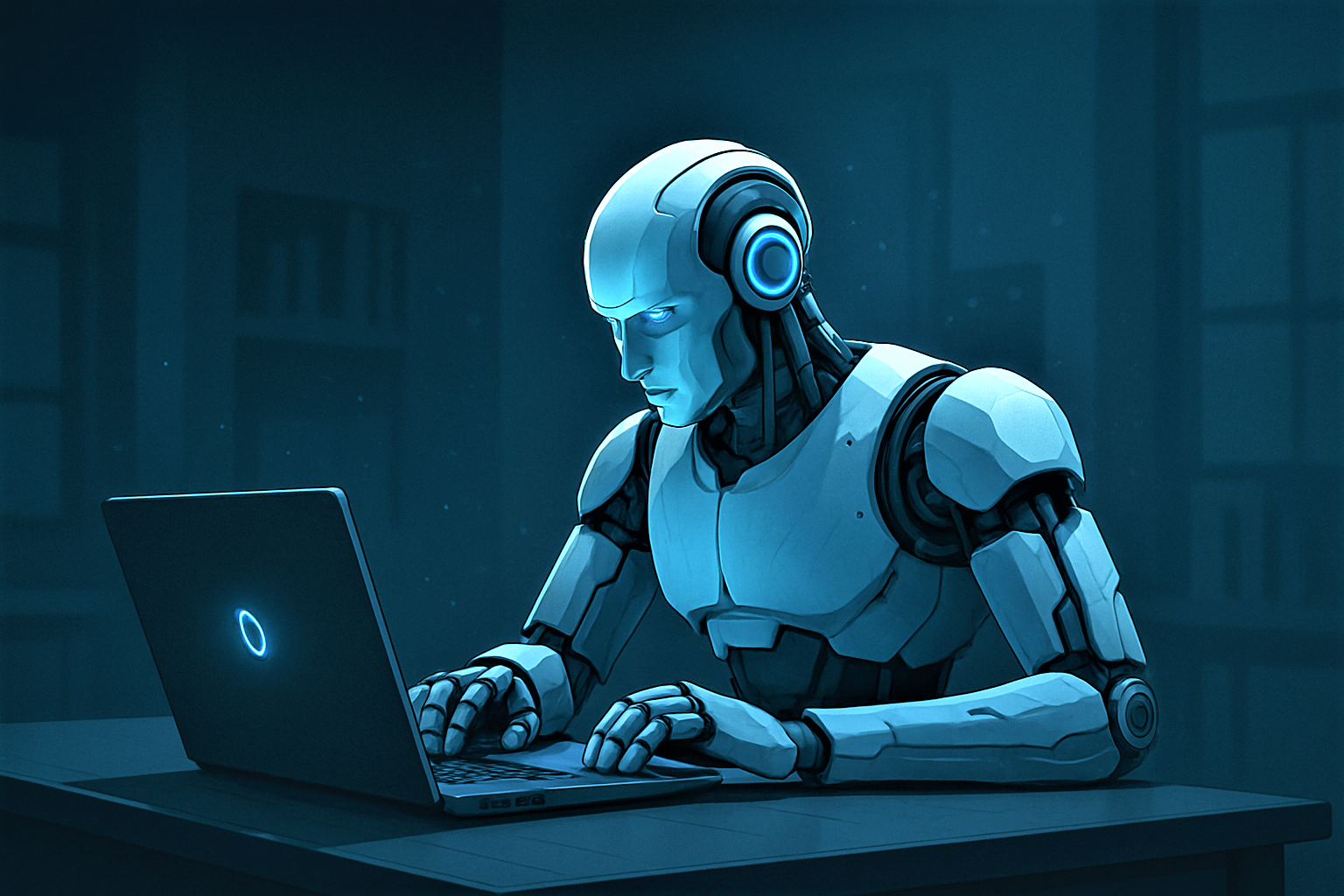The AI Revolution in the American Workplace
AI to replace US jobs – The AI revolution is in present time—it’s here and it is very much in the American workplace at a breakneck pace. Out of Blind’s in-depth study, we see reports of over 74% of US professionals think that artificial intelligence will take over their jobs within the next three years, which they also report to be on average 2.8 years out. This is a hard truth which we as a working nation must address immediately.
The Shocking Statistics That Should Not Be Missed
In 2025, a large-scale survey which ran from June 9 to 22nd had input from 3,510 professional members of staff at key U.S. companies which reports that only 26% of professionals think that their jobs will be secure once AI is fully put into play at work.
What we see is a wide variation across experience levels and between companies. Also of note is that professionals with over 16 years’ experience report to be the first to go out of the job to automation, which they expect to happen in 2.3 years on average. This goes against the grain of what we think we know, which is that experience is a buffer in an age of automation.
In the corporate world we see the same large gaps. At Salesforce, which is a tech giant, we see employees expect to be replaced by AI in 2.3 years, at Google the estimate is 2.5 years, and at Microsoft they predict 2.6 years. Also, we see that in the case of Uber, Atlassian, and PayPal, which are also tech companies but maybe a bit outside the pure AI space, the estimates are between 3.2 to 3.3 years.
In today’s world we are seeing the results of automation. 43% of professionals report that some of their tasks have been taken over by AI. Companies like Visa (58%), Grab (54%), and Walmart (54%) are at the forefront of this change, with over half of their reported staff seeing it play out.

AI Economic Impacts of Job Displacement
The World Economic Forum’s 2025 Future of Jobs Report also reports on this issue. We see that 41% of global companies will in the coming five years turn to AI for job cuts. In the U.S., that number rises to 48% of respondents who will implement AI-powered workforce reduction.
Also, what is put forth by the experts is that the issue is of a more complex nature than that of a total job apocalypse. Also, it reports that 77% of employers are looking at upskilling their present workforce to get them to work better with AI, and 47% are planning to transition employees out of declining roles into different positions within their own organizations.
Recent reports from Business Insider note that AI is indeed in the present time taking over for human jobs, which may seem like it is in the far-off future. We see in the analysis of job ads that over the past three years we have in fact seen a 19% decrease in the share of AI-doable tasks; also, the very large bulk of that change is due to the fact that companies are hiring less people for tasks that AI can do.
Industries and Professions Most at Risk
Cashiers, journalists, and factory workers. In both groups—which is 73% of U.S. adults and AI experts—it is reported that AI will cause a decline in job availability for cashiers; also, almost 60% of each group report to have the same concerns regarding other affected professions.
White collar jobs that are very much into data entry, which includes clerical and paralegal work, see a special vulnerability. We also see that in the case of accounting and graphic design, which have recently been added to the at-risk group as we have developed better generative AI models for these fields.
The professional services industry is going through great change. In that which we see of adoption of AI, the greatest take-up is by the smaller firms which report to be using AI mainly for cost efficiency and workflow automation. We are seeing real results from strategic AI investment, which report a 23% reduction in unproductive tasks when AI is used in workflows with purpose.

4 Proven Techniques for a Secure Career Future
Strategy 1: AI and Digital Proficiency
Master AI and digital literacy, become an expert in AI tools and in digital platforms, fully integrate into the digital age, lead in the development and implementation of digital solutions, and fully embrace and apply advanced digital and artificial intelligence technologies.
In the age of AI, the key skill for career survival is to learn how to work with artificial intelligence instead of competing against it. We see from research that professionals who are doing well and doing better in the present job market are those who have incorporated AI into their workflows.
Digital literacy is a must for career growth. This includes the ability to collect, interpret, and use data, which is a key element. Also, basic programming skills—we are seeing that Python, SQL, and Tableau are very much in play—and the ability to be part of data-driven decision-making teams is what is required across many industries. The focus is on changing how we think of AI growth.
As experts put it, “Which elements of AI do you put into your skill set, which into your business model—that is which jobs, which businesses, which careers will survive. Which you don’t—you’ll be left behind.” This is a basic shift which also sees the gap in education translate to a gap in economy.
Organizations are reporting that they are seeing the value in hiring AI-skilled professionals. Indeed’s data shows that GenAI skills see a 47% increase in salary, which is most prominent in sales and marketing at 43%, finance at 42%, business operations at 41%, legal and regulatory compliance at 37%, and human resources at 35%.
Strategy 2: Develop What Only Humans Can
While technology like AI may outperform us at processing big data and performing routine tasks, we still have irreplaceable human skills. Emotional intelligence, creativity, critical thinking, and complex problem solving are what bring value to the workforce in today’s environment of advanced AI.
Emotional intelligence is what makes us stand out from machines. We develop self-awareness, empathy, and social skills which in turn we use to build up meaningful relationships and effective teams. Also, in leadership roles these skills are of great value as we still are the ones that do the heavy lifting in terms of putting together great teams, resolving issues, and mentoring, which at the end of the day are very much human tasks.
Creativity and innovation is what sets us apart as a human species. AI does a great job at automation, which we as humans do not do well, but it falls short of true human creativity. What we have is the ability to think outside conventional thoughts, come up with novel ideas, and put forth innovative solutions to problems which we will always have. Also, as AI takes over routine tasks which we do daily, our creative capacity becomes even more of a precious resource which we can use for strategic and creative work.
Critical thinking and problem solving are at the core of what is required to navigate complex issues which bring in play human judgment and ethics. Although machines do a great job processing large data sets, what we as humans do best is to analyze a situation, look at all options, and put in place solutions which also take into account ethical issues and human impact.
Strategy 3: Engage in Ongoing Learning and Reskilling
The issue of very fast technology growth requires a lifelong approach to learning and skill development. In the age of AI, we see that adaptability and continuous learning are basic requirements for career survival.
Reskilling is a term used for when professionals go out and learn a totally new set of skills which they will use in a different field or into a different career path—a requirement which has been brought on many times by changes in technology which made current roles outdated. Also, as opposed to upskilling which is focused at improving on what you already know, reskilling—which is what we see more and more of in today’s world of fast technology growth—is professional development that provides the which are not related to your present skill set for a different role or industry.
The best approach going forward is to develop skills as they come up and proactively gain related expertise. In terms of what to focus on we have:
- Technical Skills: Programming languages (Python, R, Java), platforms for machine learning (TensorFlow, PyTuneur), also include data analysis and cloud computing which are high value technical skills.
- AI-Specific Knowledge: Grasping issues of AI ethics and policy, machine learning at large, and the issue of working with AI tools and platforms.
- Cross-Disciplinary Collaboration: In the coming age of work which is very collaborative and interdisciplinary, professionals will have to develop the skill set to work well with colleagues from many different fields which include technical experts.
Organizations are reporting an increase in their support for learning initiatives. We also see that 92% of businesses report they will be using AI-powered solutions by 2028 and that 73% of the surveyed employers are making it a priority to hire talent which has AI skills and experience.
Strategy 4: Develop and Grow Your Professional Networks and Craft Your Personal Brand
Professional development and personal brand are of great importance in today’s AI-dominated job market. Creating strong professional connections and positioning yourself as a thought leader in your field is key to job security.
Growing your professional network on LinkedIn and interacting with industry professionals will open up new opportunities for you and also give you an in-depth look at what is happening out there in the industry. Also, create content which displays your expertise which may be in the form of writing, speaking, or video content—this will help to build your professional brand and separate you from AI-created material. Building out a robust personal brand which puts your unique human value out there is key. This means to put forward how your set of skills and experience and what makes you a human fit the bill that AI can’t.
Strategic networking is also about being in the know regarding industry trends and connecting with professionals which are in the process of transforming their practice with AI. From others’ experiences you can learn a great deal and also you will form relationships with progressive thinkers in the field.
The Economic Opportunity in AI Transformation
While the stats on AI-related job loss are alarming, it is also true that technology transformation brings with it great opportunities. The World Economic Forum reports that out of the 85 million jobs which may disappear by 2025, 97 million new ones are expected to come into play—many of which we haven’t even thought of yet.
PwC’s 2025 Global AI Jobs Barometer reports that AI is putting workers in a better light, increasing their productivity and what they can charge in terms of higher wage premiums, at the same time that jobs are growing in fields which are most automatic in nature. The report also notes that since the rise of GenAI in 2022, we have seen productivity grow almost 3 times in the most AI-affected industries, which went from a 7% growth from 2018–2022 to 27% from 2018–2024.
Industries that are most at the forefront of AI adoption see a growth in revenue per employee which is twice as large as what we see in the sectors that are least exposed to it. This goes to say that instead of AI’s implementation leading to job loss, we are seeing a transformation of what tasks are performed and also the creation of new value in which the skilled professionals are at the forefront.
Taking Action in an AI-Driven Future
The evidence is clear: Artificial intelligence is transforming the American workplace at breakneck speed, which is to say that 74% of professionals are seeing in their near future a change in which they will see their jobs made redundant. But out of this change do come opportunities for those which put themselves forward to learn and develop the right skills.
In this new environment which is taking shape, we see that which professionals do well is those that see AI as a partner instead of a threat. By mastering AI collaboration, developing what is unique in human experience, committing to a life of constant learning, and building strategic networks, you put yourself forward not just to weather the change but to excel in the AI economy.
The choice is yours: Adapt and grow, or be left behind. The data reports that AI transformation is not a future trend—it is present now. Those that take action to secure their place in the future will be the which benefit from the great opportunities AI brings to the modern workplace.
In the years to come we will see that professionals which put together human creativity, emotional intelligence, and strategic thinking with AI powered resources are the ones that will do the best. By this time around, you have it in your power to see to it that instead of just being ready for the AI transformation, you are at the front of it.
Read latest Technology News Here
News source TeamBlind IndianExpress




